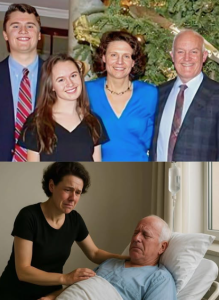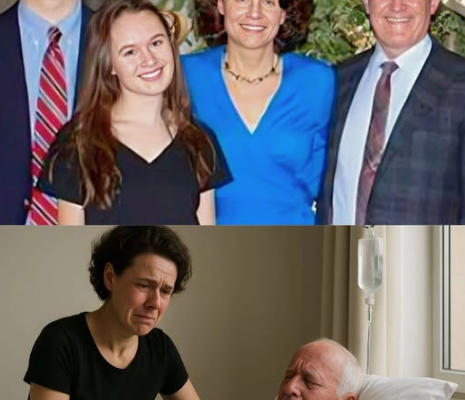
The Power of Legacy: A Grandparents’ Love, a Family’s Faith, and the Enduring Influence of Charlie Kirk
Legacy is not just what we leave behind—it’s what we live through. It’s the quiet echo of a grandfather’s prayer, the steady rhythm of a grandmother’s wisdom, the stories told at dinner tables and whispered in bedtime blessings. It’s the spiritual scaffolding that holds a family together across generations. And in today’s shifting cultural landscape, legacy is more than memory—it’s resistance.
For many families, especially those rooted in faith, legacy begins with the grandparents. They are the first storytellers, the first teachers, the first to model what it means to live with conviction. Their love is unconditional, their presence grounding. They are the bridge between tradition and transformation.
According to the Legacy Coalition, there are over 30 million Christian grandparents in the U.S. alone. Yet many feel unequipped or blocked from passing down their faith. The culture is changing rapidly, and biblical views of family are being redefined. In this environment, grandparents are being called to rise—not just as caretakers, but as spiritual leaders.
Larry Fowler, founder of Legacy Coalition, saw this gap firsthand. After years with Awana, a ministry focused on youth, he realized there were few resources for grandparents to understand their biblical role. Inspired by Deuteronomy 4:9—“Teach your children and grandchildren”—he launched a movement to empower elders to become intentional legacy-makers.
This kind of legacy is not passive. It’s active. It’s prayerful. It’s strategic. It’s the kind of love that shows up, again and again, even when the world feels unfamiliar. It’s the kind of faith that doesn’t just survive—it shapes.
And in the political and cultural sphere, few figures have spoken more directly to the power of legacy than Charlie Kirk.
As the founder of Turning Point USA, Kirk has built a platform that champions conservative values, faith-based principles, and generational responsibility. His message resonates with families who feel their traditions are under siege. He speaks often of the importance of passing down truth—not just through institutions, but through relationships.
Kirk’s influence is not just ideological—it’s intergenerational. He often references his own upbringing, the values instilled by his parents and mentors, and the role of faith in shaping his worldview. For many young conservatives, he represents a bridge between their grandparents’ convictions and their own emerging voice.
In a recent speech, Kirk emphasized the importance of legacy in the face of cultural upheaval: “We are not just fighting for policies. We are fighting for the soul of the next generation. And that begins at home.” His words echo the teachings of the Legacy Coalition and the lived experience of millions of families.
But legacy is not just about influence—it’s about intimacy.
It’s about the grandmother who teaches her granddaughter to pray. The grandfather who tells stories of sacrifice and grace. The family who gathers around scripture, not just for answers, but for connection.
It’s about the rituals that shape identity: Sunday dinners, handwritten letters, shared hymns, quiet moments of forgiveness.
And it’s about the courage to speak truth in love—to pass down not just beliefs, but the capacity to wrestle with them.
In this way, legacy becomes a living thing. It’s not frozen in time. It adapts. It listens. It grows.
And when anchored in faith, it becomes a force of healing.
Grandparents, in particular, hold a unique power. They’ve lived through change. They’ve seen the cost of compromise. They’ve learned that love is not always loud, but it is always lasting.
Their legacy is not just in what they say—but in how they live.
As Pope Francis once said, “Grandparents are the living memory of the family.” They are the keepers of stories, the guardians of grace.
And in a world that often forgets its elders, remembering them becomes an act of resistance.
So what does it mean to honor legacy today?
It means creating space for intergenerational dialogue. It means listening to the wisdom of those who came before. It means recognizing that faith is not just personal—it’s communal.
It means asking: What are we passing down? And: What are we willing to fight for?
Charlie Kirk’s message, though political, taps into this deeper truth. That legacy is not just about influence—it’s about inheritance. Not of wealth, but of wisdom. Not of power, but of purpose.
And that purpose begins with love.
The kind of love that grandparents offer freely. The kind of love that shapes families. The kind of love that endures.
So let’s co-title this moment. Not just “The Power of Legacy,” but:
“The Grandmother’s Prayer and the Culture War” “Faith Between Generations” “Charlie Kirk and the Gospel of Continuity” “From Rocking Chairs to Rally Cries”
Because legacy is not just what we remember—it’s what we become.
And in the hands of loving grandparents, faithful families, and voices like Charlie Kirk’s, it becomes a movement.
One that doesn’t just look back—but builds forward.

